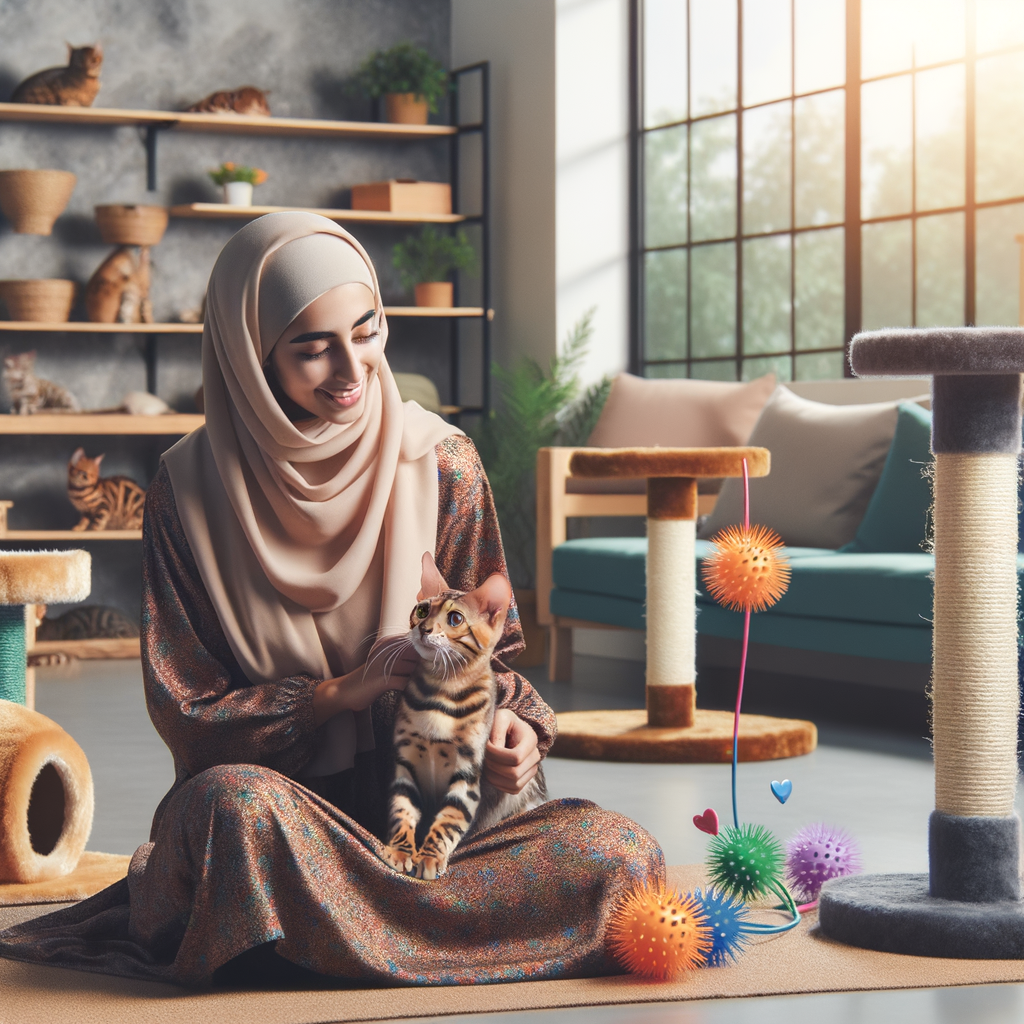
Introduction to Bengal Cat Socialization
Bengal cats are known for their playful and active nature. To ensure they grow up to be well-behaved and friendly pets, socialization is key. In this section, we will discuss why it’s important to socialize Bengal kittens and how to understand their behavior training.
- Importance of socializing Bengal kittens:
Socializing Bengal kittens helps them become comfortable around people and other animals. This makes them less likely to be scared or aggressive. Early socialization can lead to a happier and more confident cat.
- Understanding Bengal cat behavior training:
Training a Bengal cat involves understanding their unique behaviors. Bengals are intelligent and curious, which means they can learn quickly but also get bored easily. Using positive reinforcement, like treats and praise, can make training more effective. It’s important to be patient and consistent.
Bengal Cat Socialization Tips
- Creating a Bengal cat-friendly environment
To help your Bengal cat feel at home, create a space that is both safe and stimulating. Bengals are active and curious, so they need plenty of toys and climbing structures. Make sure they have cozy spots to rest too.
Here are some tips:
-
- Provide climbing trees: Bengals love to climb. Cat trees or shelves can give them a place to explore.
- Interactive toys: Toys that move or make noise can keep your Bengal entertained.
- Comfortable resting areas: Soft beds or blankets in quiet corners can help your cat relax.
- Effective Bengal cat socialization techniques
Socializing your Bengal cat involves helping them get used to different people, pets, and environments. Start socialization early and be patient.
Here are some techniques:
-
- Gradual introduction: Introduce your Bengal to new people and pets slowly. Let them observe from a distance before getting closer.
- Positive reinforcement: Reward your cat with treats and praise when they show calm behavior around new stimuli.
- Consistent routines: Keep feeding, playtime, and bedtime routines consistent. This helps your Bengal feel secure.
How to Socialize a Bengal Cat
- Introducing new people to your Bengal cat:
When introducing your Bengal cat to new people, it’s important to do it slowly. Start by letting your cat observe the new person from a distance. Allow your cat to approach at their own pace. You can use treats to create positive associations. Remember, patience is key!
- How to handle a Bengal cat:
Handling a Bengal cat requires gentle and confident movements. Always support their body and avoid sudden grabs. Bengals are active and curious, so give them time to explore. If they seem stressed, give them space and try again later. Consistent, gentle handling builds trust over time.
Teaching Your Bengal Cat to Play
- Interactive toys for Bengal cats:
Bengal cats are very active and curious. They love toys that challenge their minds and bodies. Some great options include:
-
- Feather wands: These toys mimic the movement of birds, which can keep your Bengal cat entertained for hours.
- Laser pointers: These can make your cat run and jump, providing excellent exercise.
- Puzzle feeders: These toys make your cat work for their food, which can help stimulate their brain.
- Playing with your Bengal cat:
Spending time playing with your Bengal cat is crucial for their social skills. Here are some tips:
-
- Set aside time daily: Aim for at least 15-20 minutes of playtime each day.
- Use a variety of toys: Rotate toys to keep your cat interested and engaged.
- Encourage interactive play: Use toys that require your involvement, like feather wands or string toys, to build a stronger bond with your cat.
Common Challenges in Bengal Cat Socialization
- Dealing with aggressive behavior
Bengal cats can sometimes show aggressive behavior. This might be due to fear, lack of socialization, or even health issues. To manage this:
-
- Identify the cause: Observe your cat to understand what triggers the aggression.
- Provide a safe space: Ensure your Bengal has a quiet place to retreat to when feeling stressed.
- Use positive reinforcement: Reward calm behavior with treats and praise.
- Consult a vet: If aggression persists, seek advice from a veterinarian.
- Helping a fearful Bengal cat
Fearful Bengal cats need patience and gentle handling. Here are steps to help them feel secure:
-
- Gradual exposure: Slowly introduce your cat to new people and environments.
- Consistent routine: Keep feeding and playtimes regular to build trust.
- Interactive play: Use toys to engage your cat and build confidence.
- Comfort items: Provide blankets or toys that have familiar scents.
Conclusion: The Rewards of Bengal Cat Socialization
Socializing your Bengal cat is a journey filled with many rewards. A well-socialized Bengal cat is not only happier but also healthier. Let’s look at some key benefits and why continued socialization is essential.
- The benefits of a well-socialized Bengal cat:
- Better Behavior: A socialized Bengal cat is less likely to show aggression or fear.
- Stronger Bond: You will have a closer relationship with your cat.
- Healthier Cat: Socialized cats are often less stressed, leading to fewer health issues.
- More Fun: A friendly Bengal cat is more playful and engaging.
- Continuing socialization throughout your Bengal cat’s life:
- Consistency: Keep up with social activities to maintain your cat’s social skills.
- New Experiences: Introduce your cat to new environments and people regularly.
- Ongoing Training: Reinforce good behavior with positive reinforcement.
- Health Check-ins: Regular vet visits can help monitor your cat’s well-being.
Your effort in socializing your Bengal cat will pay off in many ways. Your cat will be happier, healthier, and more enjoyable to be around. Remember, socialization is a lifelong process that requires consistency and love.






